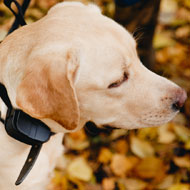Electric shock collars to be banned

Evidence suggests electronic collars can redirect aggression or generate anxiety-based behaviour in pets.
Electronic training collars for dogs and cats will be banned under new legislation, environment secretary Michael Gove has announced.
The ban, which follows a public consultation, will not include invisible fencing systems that are used to keep pets - especially cats - away from roads.
Out of more than 7,000 responses to the consultation, around 50 per cent specifically said they did not want containment fences to be included in the ban.
Evidence suggests electronic collars can redirect aggression or generate anxiety-based behaviour in pets, making their health and behaviour problems worse. There are also concerns about them being used to inflict unnecessary harm and suffering.
Announcing the ban, Mr Gove said: “We are a nation of animal lovers and the use of punitive shock collars cause harm and suffering to our pets.
“This ban will improve the welfare of animals and I urge pet owners to instead use positive reward training methods.”



 The Veterinary Medicines Directorate (VMD) is inviting applications from veterinary students to attend a one-week extramural studies (EMS) placement in July 2026.
The Veterinary Medicines Directorate (VMD) is inviting applications from veterinary students to attend a one-week extramural studies (EMS) placement in July 2026.